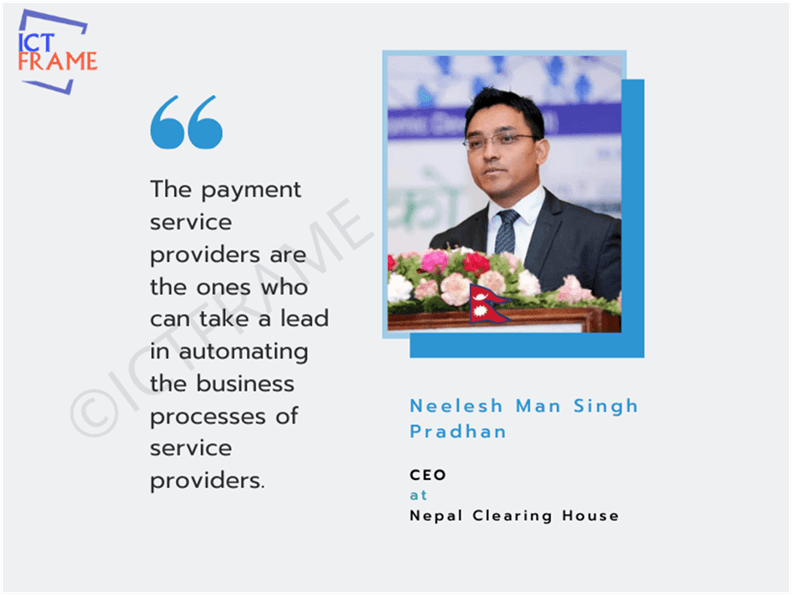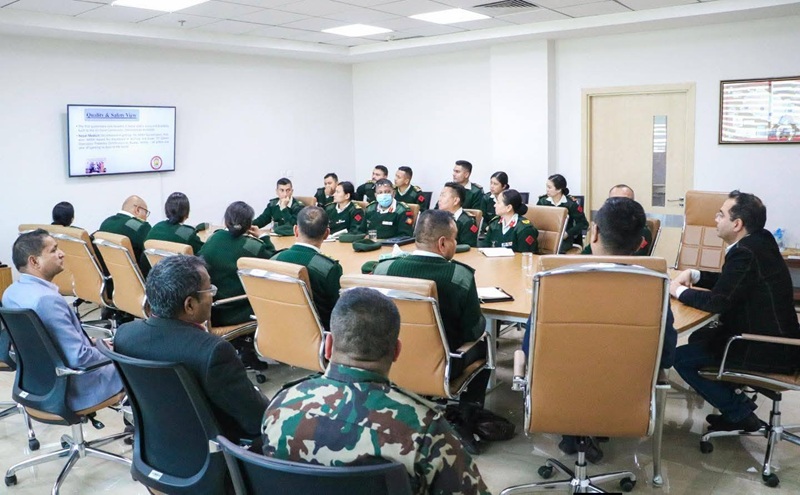Digital Payment: Challenges and Possibilities in Nepal
Kathmandu, May 4th, 2020
Digital Payment is definitely growing in popularity and is becoming a trend these days. The reason is simple – convenience. In the era when businesses are shifting online, why not transactions!
The question, however, is if Nepal’s economy is ready to go cashless. What could be the challenges and the possibilities of that happening?
We asked the CEO of Nepal Clearing House for some insight. Here’s how he answered our questions:
Interview with Neelesh Man Singh Pradhan – CEO, Nepal Clearing House Limited (NCHL)
Q. Going forward, how will digital payment impact Nepal’s economy?
A: Looking at the current scenario, it seems like digital payment platforms will take a notable uptake after the lockdown. Both service providers and customers will consider adopting cashless transaction methods. The business model will take a shift with the development of infrastructures and the availability of digital payment services.
I believe the business model that limits the necessity of any type of physical access or contact will be given priority. Thus, customers will be able to make payments and service providers will be able to accept online transactions.
Also Read: Best Digital Payments In Nepal In 2020
Q. Do we have enough resources to go cashless?
A: It is sure that the economy can’t go completely cashless as no nation has been able to do so with its economy. The best we can do is promote non-cash transactions and progress forward. We don’t have the resources to go cashless overnight and even if we did, it’s the people’s acceptance that affects the process as well.
So, we should take this as a journey in which we should focus on building the infrastructure. Similarly, it is important that people are on board and they accept this business model. In this course, we should also update our security features and inform customers of the security threats.
Also Read: Nepal Digitization During Corona, How Fast Can Nepal Go Cashless?
Q. What are the challenges in the digital payment sector?
A: The first challenge of any sector is the acceptance of the services it provides. The stakeholders along with the users who accept digital payment platforms are equally important in this ecosystem.
In the present context, the process for getting service providers on board for integrating online transactions to sell their products/services is quite lengthy. Similarly, their acceptance is also relatively slower. So, I guess the process for involving them in this ecosystem is the first challenge.
Another is the resource constraint for operating and sustaining locally developed or franchised digital payment platforms. It involves the operation of these systems, infrastructures, and security features.
Q. If we move towards mandatorily digitizing cash flow, how will it affect the rural areas?
A: The digital payment trend in urban areas prior to the lockdown was driven by convenience. The customer has the option to use either card, cash, m-banking, etc. After the lockdown, convenience may convert into a necessity.
However, with the increase in demand for non-cash transactions, it might eventually lead to a digital divide. The areas where people haven’t yet adopted such technology might fall behind in the ecosystem. If this happens, the service providers may have to downgrade their services so that people in such areas can access them.
Q. What can be the roles of the digital payment platforms to boost the economy of Nepal?
A: In this ecosystem, a single stakeholder cannot contribute to the economy’s boost-up. For this, different stakeholders along with payment service providers (PSP) and payment service operators (PSO) need to adopt a collaborative model. The entities that should collaborate can be PSPs, banks, and service providers or sellers.
The collaboration of these three is essentially important to increase digital transactions. The roles of PSPs and PSOs are definitely significant in issuing the payment infrastructure and instruments. Basically, they are the ones who can take a lead in automating the business processes of service providers.
Q. Can you give us some insight into the future plans of NCHL after the lockdown?
A: The overall strategic plan of NCHL is to implement the policies set by Nepal Rastra Bank regarding national payment. Our strategies are driven by these plans and policies which led to the launch of our services like Electronic Cheque Clearing (ECC), ConnectIPS, ConnectRTGS, etc.
For the availability of our services especially during or after the lockdown, our strategies will become more tactical. Our primary focus will most likely be in the area where a financial institution is offering transactional services to any business entity and the impact of the lockdown has generated the need for automation. Otherwise, our actual direction clearly is towards clearing settlement, building up the infrastructure of national payment systems, and getting service providers on board.
You May Also Like: Nepal’s History In Digital Payment System, NCHL
Q. Do you think there are too many digital payment platforms in the Nepalese market?
A: I don’t think that the market is currently overcrowded. If we focus on a cashless economy, we haven’t yet explored its possibilities in many sectors. So far, the PSPs and PSOs in existence are focusing more on the retail industry and maybe there’s noticeable overlapping in this area. However, we still have entire, segregated, and untouched industries that still need a lot of work in the field of digitization.
For now, the regulators need to drive their attention in preventing the overlap on the same set of infrastructure and market. There are factors like interoperability and shared infrastructures that could help prevent overcrowding. But, there’s no immediate need to point out the existence of different digital payment platforms in the market.
Final Thought
The main reason why people have purses or wallets on them is to carry cash and cards. In a rather digital world, smartphones are likely to replace them all. One’s identity to bank account information, everything will shift to an e-wallet.
A 100% cashless economy is still a far-fetched idea due to reasons like security and the digital divide. But, it is not impossible if enough work is put into building the infrastructure and raising awareness.
Do you see Nepal’s economy going cashless? Do you have any suggestions?
Let us know!








